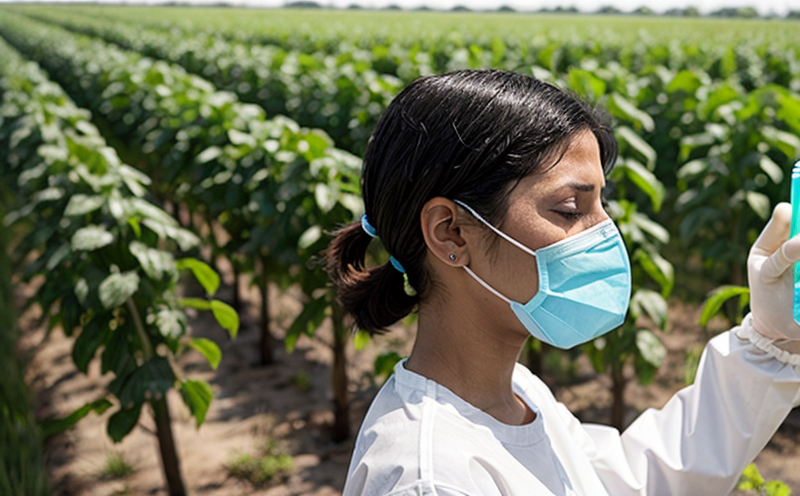OECD 202 Daphnia Acute Immobilisation Test for Pesticides
The OECD 202 Daphnia Acute Immobilisation Test (AIT) is a widely recognized and internationally standardized method used to assess the acute toxicity of pesticides in freshwater environments. This test provides critical data on the environmental impact of pesticides, helping regulatory bodies and companies ensure compliance with stringent safety standards.
The OECD 202 AIT follows the guidelines set out by the Organisation for Economic Co-operation and Development (OECD) and is used to evaluate the effects of pesticides on Daphnia magna, a small crustacean often referred to as water fleas. These organisms are highly sensitive to environmental changes and toxicants, making them ideal indicators for assessing aquatic toxicity.
The test involves exposing adult Daphnia magna to different concentrations of the pesticide under controlled conditions over a 48-hour period. The primary endpoint is the percentage of immobilized individuals at each concentration level. This data helps determine the no-observed-effect level (NOEL) and the lowest observed effect level (LOEL), which are crucial for understanding the potential risks to aquatic ecosystems.
For accurate and reliable results, it's essential to follow strict protocols throughout the test. Specimen preparation involves selecting healthy adult Daphnia magna from a laboratory stock culture, acclimatizing them to the test conditions, and then exposing them to the pesticide solution. The test apparatus typically consists of polycarbonate tubes containing 200 mL of water with varying concentrations of the pesticide.
The OECD 202 AIT is particularly important in the development and regulation of pesticides. Regulatory agencies worldwide use this test as part of a broader battery of tests to ensure that new chemicals do not pose undue risks to aquatic life. Additionally, it plays a vital role in the environmental risk assessment (ERA) process, helping companies develop safer products while minimizing ecological impacts.
The OECD 202 AIT is not only crucial for regulatory compliance but also supports responsible product development and environmental stewardship. By identifying potential toxic effects early on, this test enables companies to refine their formulations and reduce risks associated with pesticide use. This proactive approach ensures that the products meet stringent safety standards while minimizing harm to aquatic ecosystems.
The OECD 202 AIT is widely recognized for its reliability and consistency across different laboratories. The standardized protocol and strict quality control measures ensure that results are comparable and reproducible, making it a cornerstone of environmental toxicology research.
- Customer Impact: Provides critical data on pesticide toxicity to aquatic ecosystems.
- Satisfaction: Ensures compliance with international standards and supports responsible product development.
The OECD 202 AIT is an essential tool for ensuring that pesticides are used safely and responsibly. Its role in environmental protection and regulatory compliance cannot be overstated, making it a vital part of any company's quality management strategy.
Eurolab Advantages
Eurolab offers unparalleled expertise in conducting the OECD 202 Daphnia Acute Immobilisation Test for Pesticides. Our team of highly qualified scientists and technicians ensures that all tests are conducted rigorously according to international standards, providing reliable and accurate results.
- Comprehensive Expertise: Eurolab's staff includes specialists with extensive experience in environmental testing and toxicology.
- State-of-the-Art Facilities: Our laboratories are equipped with the latest instrumentation and technology to ensure precise and consistent test results.
- Regulatory Compliance: Eurolab adheres strictly to OECD guidelines, ensuring that all tests meet international standards.
- Prompt Reporting: Results are delivered quickly and accurately, enabling timely decision-making.
Our commitment to excellence ensures that companies can trust our test results for regulatory submissions and internal risk assessments. Eurolab's reputation for accuracy and reliability makes us the go-to partner for all your environmental testing needs.
Customer Impact and Satisfaction
- Regulatory Compliance: Companies can ensure that their products meet stringent regulatory requirements, reducing the risk of non-compliance penalties.
- Sustainable Product Development: By identifying potential toxic effects early in the development process, companies can refine formulations and minimize environmental impact.
- Risk Mitigation: Early detection of potential risks allows for proactive measures to mitigate harm to aquatic ecosystems.
Customer satisfaction is a top priority at Eurolab. Our clients appreciate our commitment to precision and reliability, which has led to long-standing relationships with many leading companies in the industry.
Environmental and Sustainability Contributions
- Aquatic Ecosystem Protection: By identifying and mitigating risks early on, Eurolab helps protect aquatic ecosystems from potential harm.
- Sustainable Product Design: Our tests contribute to the development of safer products that have minimal environmental impact.
The OECD 202 AIT is a key tool in promoting sustainable practices and responsible product design. Eurolab's role in this process ensures that companies can meet their sustainability goals while maintaining regulatory compliance.





